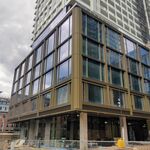buildup
Senior Member
Several reasons projects which haven't broken ground, yet might be 70% sold, could get cancelled include:
- a desire for a buyer to back out because (s)he feels current market value is lower than what was paid
- the asset they plan to sell to pay for the committed purchase has fallen
- the developer can't get financing to build
- higher constrcution costs
So both buyers & builders might be having difficulty.
So which projects seem at risk? I'd suggest 77 Charles & The Saint Thomas seem stalled.
- a desire for a buyer to back out because (s)he feels current market value is lower than what was paid
- the asset they plan to sell to pay for the committed purchase has fallen
- the developer can't get financing to build
- higher constrcution costs
So both buyers & builders might be having difficulty.
So which projects seem at risk? I'd suggest 77 Charles & The Saint Thomas seem stalled.




